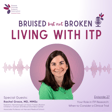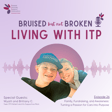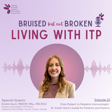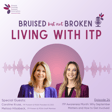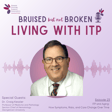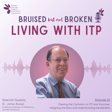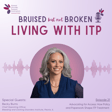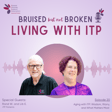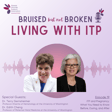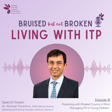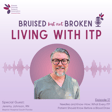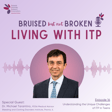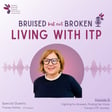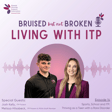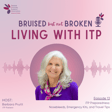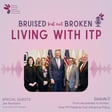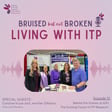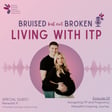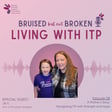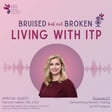Introduction to 'Bruised But Not Broken'
00:00:00
Speaker
When others would give up, the rare disease community does not. It's just an amazing group that I'm honored to serve and support.
Meet the Host and Guest: Barbara Pruitt and Pam Gavin
00:00:18
Speaker
welcome to the pdsa podcast bruised but not broken living with itp The diagnosis of a bleeding disorder like immune thrombocytopenia may leave you wondering, how can I really live my life with ITP?
00:00:32
Speaker
PDSA's podcast, Bruised But Not Broken, Living with ITP, brings empowering stories, the latest research and treatment updates, lifestyle tips, and answers to the real-life questions the ITP community is asking.
NORD's Mission and Personal Connection
00:00:46
Speaker
Here's your host for this episode, Barbara Pruitt.
00:01:03
Speaker
filling in today for Barbara Pruitt. And as we celebrate Rare Disease Week, I'm very excited to talk with today's guest, someone I've known for many years, someone I greatly admire.
00:01:16
Speaker
Pam Gavin is the CEO of the National Organization for Rare Disorders, or NORD, the nation's leading rare disease patient advocacy organization. driving progress at the intersection of care, research, and policy for all rare diseases.
00:01:33
Speaker
Since joining NORD in 2012 as its first Chief Operating Officer, PAM has spearheaded transformative initiatives including Centers of Excellence, the first natural history study patient registry platform, and much more.
Advocacy and Impact on Rare Diseases
00:01:48
Speaker
Prior to NORD, PAM held leadership roles in healthcare care safety and delivery, including at the University of Pittsburgh Medical Center and as a founder of Safe Care Systems.
00:02:00
Speaker
She earned her and MBA in healthcare care management from Northeastern University and a BA in biology from Smith College. Pam, welcome to Bruised But Not Broken. I am so happy you could join us today.
00:02:13
Speaker
It's my pleasure and honor. Thank you, Caroline. Really appreciate it. Well, you and I have known each other, i think for more than 10 years now, and PDSA has been a member of NORD for more than 20 Please tell our listeners about Nord's mission and your personal connection to a rare disease.
00:02:35
Speaker
It's hard to believe that that much time has gone by since when we first met. Nord has been an advocacy group for over 40 years, really started by folks like yourself and other advocates and to address a significant unmet need when it kind came to medical um development, medications and therapies for people living with rare conditions because of the small patient populations.
00:03:00
Speaker
I had good fortune of running into a NORD through a ah personal connection. My brother's son was born with metachromatic leukodystrophy. And when we finally got the accurate diagnosis, the genetic counselor suggested we reach out to NORD for support.
00:03:21
Speaker
NORD, as you had mentioned, is an advocacy organization. that's really focused on serving the rare disease community, making sure it has a voice when it comes to policy needs and issues, access to clinical care, a proper and ah diagnosis, and in the support of research, the conduct of research, the acceleration of rare disease research, and and ensuring also that clinical trials, that we have an environment that is fertile for clinical trials to be run,
00:03:54
Speaker
to be designed and executed to meet the needs of the rare disease community, and hopefully with the idea that those trials will lead to products to be approved by the FDA.
Orphan Drug Act and NORD's Community Support
00:04:05
Speaker
I know that, you know, NORD has more than, I think, 280 rare disorder member organizations, and PDSA and our ITP patient community is actually very fortunate that there are a number of treatments for our patient population, for our disease. And I know from attending the NORD member meeting each year in Washington, DC, that many of these organizations don't even have a treatment for their patients.
00:04:41
Speaker
That is correct. what What's happened since the Orphan Drug Act was passed and NORD was formed over 40, you know, yeah in the last 40 years, that we've seen incredible progress when it comes to therapies being developed. I think we're you know in the 900s now, which is just tremendous progress as as it relates to the incentives that the legislation laid the groundwork for.
00:05:05
Speaker
However, we've outpaced our scientific and medical discovery has really outpaced the development of treatments, the rate of treatment
NORD's Goals and Community Involvement
00:05:14
Speaker
development. And so we still are left with over 90%, 95%
00:05:19
Speaker
ah the 10,000 we know about that are are left without a treatment.
Legacy of Abby S. Myers and Orphan Drug Act
00:05:24
Speaker
But really, NORD's existence is to serve the rare disease community, and the backbone of NORD is its member organizations like PDSA.
00:05:34
Speaker
Our goal is to support them, um support their capacity building, help them in their educational efforts, ensuring that they continue to be strengthened in their ability to serve their community um and educate the medical community.
00:05:50
Speaker
and bring awareness collectively to the shared issues and challenges and concerns of all rare diseases. It's really an incredible partnership. Our member organizations are literally written into our bylaws. So they, when I say they're the, our backbone, the foundation, nor its existence, it is part and parcel of who nor it is.
00:06:12
Speaker
Our priorities and goals are really set by our board of directors. with input from our member organizations like PDSA. Well, PDSA was honored in 2019 to receive NORD's Abby S. Myers Leadership Award for the work we were doing on behalf of the ITP community. And I have to tell you, it truly was ah the highlight, I think, of my 17 years with the with the organization. We were truly honored to receive that award.
00:06:43
Speaker
Who Abby S. Myers, and why was there a need in the beginning to have an organization such as NORD? Abby S. Myers is the famous first executive director, founder of NORD.
00:06:58
Speaker
She, along with other parents and caregivers and and People living with rare diseases were part of that advocacy, that grassroots movement that advocated to Congress that something be done to address financial incentives so that um companies and researchers would research rare disease therapies because um the economics prior to the Orphan Drug Act weren't there to put the time, the resources and energy into studying these small
00:07:32
Speaker
ah these conditions that affect small patient populations. Abby was a um fearless leader. As she said, a mom from Southern Connecticut, not somebody with a policy background or a medical background or a science background.
00:07:49
Speaker
She, um along with the other advocates, just knew that they needed to do something to to save their loved ones and they're and give voice to them and their children in Abby's case.
PDSA's Research Initiatives and Collaborations
00:08:00
Speaker
And so for us, it was very fitting as we look year to year, at look back at what great achievements have been made to name an award after Abby for someone like yourself, Caroline, who is so well-deserving, these fearless leaders who put it all on the line to fight for a better day, to raise awareness, to really understand where the challenges that exist in our healthcare system in society for people living with rare conditions and work together to to remove those challenges, to think creatively about how we come up with new solutions that meet the needs of the rare disease community.
00:08:44
Speaker
So it was it was wonderful to see. It was such a well-deserved honor for us to to give you. Well, thank you. I think so many of us that run rare disease organizations or who are the founders of rare disease organizations are patients or parents or have some personal connection to someone with a rare disease.
00:09:10
Speaker
And we all wear multiple hats, as you know, Pam, when you run a when you run a small nonprofit. We are always, you know, we might be small but mighty. And I'm sure you've heard many patient advocates say that. But I i always give credit to NORD for playing a significant role in the development of PDSA's research program.
00:09:32
Speaker
I mean, we're in our 27th year now. And over the years, I felt we always did a really great job working of educating and supporting our patients. But we didn't really have a research program, which is one of the four pillars of our mission statement. So back in around 2015, 2016, I attended the annual NORD Breakthrough Summit in Washington, D.C., and I attended a workshop led by folks from PCORI, which is the Patient-Centered Outcomes Research Institute,
00:10:04
Speaker
And that's where I learned about an opportunity through PCORI, which helped us establish our framework for our research program. And because of that program, PDSA has awarded more than $400,000 to investigators conducting innovative ITP patient-centered research.
00:10:23
Speaker
And I'm proud to say that we've provided seed money for more than 20 research projects over the past 10 years. And I think the most important collaboration with NORD is the I Am Rare program. And back in 2016, PDSA received a scholarship from NORD through a cooperative agreement with the FDA to establish our ITP natural history study patient registry.
00:10:48
Speaker
And we have over 2,000 patients and caregivers who are now enrolled in the in the registry.
I Am Rare Program's Role in Research
00:10:55
Speaker
Pam, talk about the I Am Rare program, what is what it is and its impact on the rare disease community.
00:11:03
Speaker
Sure. Thank you for that. This is this is um a labor of love, so you it's easy for me to talk about. Before I came to Nord, I i was working in the healthcare information technology space, working with hospital you know hospitals, clinicians, clinician groups, et cetera,
00:11:21
Speaker
And when my nephew was diagnosed and there were no treatments for him, he was cared for predominantly in the home by visiting nurses, an amazing group of small group of people that really became extensions of my family. And he got incredible care by these loving, caring, talented individuals.
00:11:41
Speaker
They would bring laptops to the house and they would have their care plans for my nephew and they would enter in data about his progress or lack thereof and what medications were provided, what um treatments were provided and any of his reactions while they were caring for him.
00:12:01
Speaker
And i i I had started at Nord and there was some discussion around with the FDA and and NIH around not really having good natural history.
00:12:14
Speaker
we We have so many rare diseases for which people know very little about. um and helping um researchers and drug companies de-risk the process, s patients and patient advocacy organizations, caregivers can contribute what they know and understand and live day to day about these conditions, many of which are the experts.
00:12:37
Speaker
And, you know, i I put two and two together between my nephew's experience and my professional experience in healthcare IT, and what we were hearing.
00:12:50
Speaker
And like many of Nord's programs, we have limited funding. So our focus is often on investing in things that can help our members thrive, you know, rising tides elevates all boats as a philosophy that we use.
00:13:05
Speaker
And so really the idea for putting this platform, this software platform and wraparound services to help people who've never done this before, launch these studies on, and it's, and it's the I am rare program.
00:13:20
Speaker
So we started in 2014. And one of the things that we realized was that our member organizations needed help. They needed resources, they needed expertise.
00:13:32
Speaker
And so we went back to the FDA and, you know, and said, we would like a grant to be able to do this for our member organizations. And that's,
00:13:44
Speaker
how that came about. And I'm so glad that PDSA got to be a part of it, but it really puts you all in the driver's seat to convey the information that they um know to be true, that they're living through.
00:13:58
Speaker
And when you're aggregating it, it's not just one story anymore. You're looking at patterns, you're looking at trends, you're providing collectively insight that is very helpful to researchers and those who who are developing therapies for your condition.
00:14:15
Speaker
To me, it is really ah core component of being patient-centered when it comes to drug development. It is an element of an overarching view that we have patient-focused drug development programming.
00:14:28
Speaker
It starts with those living with the condition and those caring for those living with the condition.
Addressing COVID-19 Concerns with PDSA Registry
00:14:34
Speaker
Yeah, back in 2018, when I attended another ah of the NORD Breakthrough Summits, there was a workshop presented by the FDA.
00:14:43
Speaker
um on organizing an externally-led patient-focused drug development meeting, which really gave us the blueprint and the the tools to organize our own very successful yeah ELPFDD meeting in 2019 in Washington, D.C.
00:15:01
Speaker
But it was really because of the registry, especially the data we collected from patients on health-related quality of life, like fatigue, anxiety, depression,
00:15:13
Speaker
that gave us the real world evidence on the impact of ITP on our patient community. And, you know, now the FDA wants pharmaceutical companies developing new treatments to include in their clinical trials, clinical endpoints that are important to patients. So that data is really crucial. And as you said, you know, bringing the patient voice, the patient experience.
00:15:36
Speaker
I know, you know, within itp research that We had conducted a survey a number of years ago, and we we surveyed both physicians and patients. And when we surveyed physicians about the most bothersome symptom of the disease, they said it was bleeding because it's a bleeding disorder. But when you surveyed patients, they said it was fatigue, debilitating fatigue.
00:16:02
Speaker
And prior to that, that was not a clinical endpoint that was included. And so I think, you know, as you have seen over the years, it's really shifted the research. And of course we have to have the data, right? So that's why registry is so important.
00:16:18
Speaker
Absolutely. That's fantastic. That is, that's a perfect example of the power of these PFDD meetings and really to incorporate patient and caregiver experience into the the process early on, even before clinical trials are, the development of them and the structure of them are taken into consideration.
00:16:42
Speaker
And, you know, prior to PDSA having our IAMRAR registry, I hadn't been an an author on any abstracts or publications. And I think I'm now close to 50.
00:16:57
Speaker
publications that I'm an author on, and I would say the majority of them are are you know from our registry. And to be able to present that that data and to be able to, as a patient representative, to be listed on scientific research that's presented at you know scientific meetings like ASH, the American Society of Hematology, or the European Hematology Association, or other prestigious publications like Blood.
00:17:28
Speaker
And another example of a really important way that PDSA was able to use our registry was during COVID. When the COVID vaccines first came out,
00:17:41
Speaker
And very unfortunately, within the first couple of weeks, there was a physician who had not had ITP, or at least they weren't aware that he had had ITP. And he had a vaccine and his platelet count dropped and he passed away. So people within our community, of course, were very concerned. And we received many emails and phone calls and our our medical advisory board put out a consensus statement on the importance you know of the COVID vaccine because we knew that any type of virus could also drop your platelet count. So we added some survey questions to the registry on on COVID and we asked our patient population to go in and fill those surveys out. And because of that, we were actually able to publish data in blood
00:18:32
Speaker
showing that there really wasn't any correlation between receiving you know the vaccine and a drop in platelet count. So every time you know a patient or caregiver would contact the office, we could point them to that data. And so that's just really another very, very critical role that a registry can play within a patient population and organization.
Significance of Rare Disease Day
00:18:56
Speaker
That's fantastic. Another great example of the power of um using tools like that to further your advance, your cause and your knowledge base amongst your members of your community. That's fantastic.
00:19:10
Speaker
Yeah. Well, the end of February is very significant because, of course, it is Rare Disease Week, Rare Disease Day. More than 30 million people in the U.S. are living with a rare disease. I think there are around 7,000 rare diseases.
00:19:28
Speaker
Would you talk a little bit more about Rare Disease Day and why it's so important today? Sure. As you said, Rare Disease Day is recognized on the rarest day of the calendar.
00:19:41
Speaker
And so that is February 29th. And when it's not a leap year, it's celebrated on the 28th, the day before the last day of February. ah NORD is a ah U.S. sponsor of Rare Disease Day across a national alliance working with URTIS,
00:19:59
Speaker
and other national charities to representing different countries. And together we work driving this collaborative awareness campaign across the globe.
00:20:10
Speaker
And so the work that our members do to raise awareness for their disease and for rare diseases in general is really important because you know it's so it's a way for people to recognize the significant public health issue that it is.
00:20:28
Speaker
For rare diseases in particular, when someone hears the word rare, they think, oh, not a big deal, must be a small group, no need to put a lot of time and energy into it.
00:20:39
Speaker
but or perhaps that's just one family's issue or problem and you just move on. You know, you talk to somebody, you see them at the grocery store, you see them at, you know, a community event. But in reality, all collectively, there are, there are, as you said, 30 million. So that, and that's in the United States, that's one in 10.
00:20:57
Speaker
So rare diseases affect your family, your friends, They're in your school. It's in your in your professional ah life. And so collectively, we really do need to raise awareness of the issues and challenges that exist.
International Collaboration Among ITP Groups
00:21:11
Speaker
Our healthcare system wasn't established to take care of the rare conditions. It was established, for the most part, to take care of the most common conditions. And so there's a lot of similarities.
00:21:22
Speaker
In studying rare disease, you can learn about how to treat common conditions that have similar symptoms and similar elements. So there's definitely benefit that can be applied to more common conditions.
00:21:34
Speaker
But it is a time for us to gather across the globe to raise awareness, um to advocate for um the rights of people to live their best life, the healthiest life they can live, advocate for dollars spent on research to improve our understanding of rare conditions, to improve access to treatments, to improve the number of treatments that exist.
00:21:56
Speaker
All of those things are critically important to have an accurate diagnosis that that's expeditious and not a long five to seven year, eight year journey to figure out what it is that somebody that ails someone. So there's lots of reasons for us to unite and raise awareness and celebrate the special elements of this rare community that we we share, we have in common.
00:22:23
Speaker
I oversee the International ITP Alliance, and we now have 33 patient associations from 30 countries. And while we might have some different languages and some cultural differences, you know, what what's common among us as rare disease patients, and of course, patients who have ITP, I think we face a lot of the the very same challenges. And I always say, while you can have very supportive family and very supportive friends.
00:22:56
Speaker
No one knows what you go through like another patient who has the same disease that you have. That's true. That's fantastic that you've but you've got such a great network. It's so, so important.
00:23:09
Speaker
It has such value, as you've just said, to somebody who's been newly diagnosed. or or even not. you know it doesn't It's not like a water faucet that you turn on and turn off. but These are situations people live with a very, very long time. So it's wonderful to have that support network. And you're all working together common needs and
Legislative Efforts and Advocacy Importance
00:23:33
Speaker
issues. And it takes all of us working together to to make the progress we need to make.
00:23:39
Speaker
Yeah. Well, and of course, we know that advocacy is such a significant initiative to ensure that patients, especially rare disease patients, have access to the care they need, which we actually talked about in our last podcast episode. And of course, with every election year comes policy changes at all levels, which ah is causing a bit of uncertainty among our patients. I'm so i'm sure you're seeing seeing it as well, Pam, and with many of the member organizations, many of the
00:24:11
Speaker
the NORD member organizations. ah Can you share any changes that you're seeing that could impact rare disease patients? Or is there anything that you would like to share with the rare disease community or the ITP patient community at this time?
00:24:27
Speaker
Well, you know, we we have quite a bit of legislation that was poised to be approved through bipartisan process last December, and much of it was put on hold.
00:24:40
Speaker
And so when we look at the continuing resolution, we are very hopeful that because the legislation got bipartisan support, that a lot of the work that was done last year will come into this package and be approved.
00:24:56
Speaker
and And they're meant to do several things to help the rare disease community. One is um extend the telehealth waivers. As you know, often to find people with expertise that you're that you need, you don't necessarily live close enough. So the telehealth or you have physical...
00:25:15
Speaker
challenges that make it difficult for you to see the specialists you need to see. So we're hoping that that will continue. We'll get that passed in the package. And the same with some other language related to innovation, ensuring like the priority review vouchers.
00:25:31
Speaker
that they continue to be, that they get reauthorized by Congress because it it's incentivizing people to study rare disease. We do, you know, relative to the new administration and the executive orders and the changes that are taking place as we get new leadership and, and you know, waiting for four positions at the FDA and NIH to be filled.
00:25:53
Speaker
We are concerned that we don't go backward in our ability to conduct research in rare disease, that we that we don't lose ground in all the work that was done up to this point in time. You know, we're on the precipice of some incredible cures with cell and gene therapy, and we don't want to take any steps back. So as the process evolves, our hope is that, you know we can make up for this time where things have been put on pause or the concern for cutting
00:26:27
Speaker
budgets, we certainly want to be fiscally responsible, but we also don't want to really take us back when it comes to research in rare disease. We're also concerned that to fund any future programming, whether they be tax-based or other otherwise, that programs like Medicaid don't get cut to the point where they harm rare disease patients.
00:26:51
Speaker
As you probably know, Caroline, many children that have rare diseases are get their coverage, health care services and coverage under Medicaid.
00:27:02
Speaker
And so there's been some concern around cutting Medicaid, which would harm children with rare diseases in this country. So we are we don't want to jump to conclusions before we see any data and we see any any real concerns.
00:27:17
Speaker
legislation that we can analyze and evaluate the potential impact. But we're concerned that if that were to happen, the community really needs to galvanize around and have a really strong, unified voice on the impact that such potential cuts could have.
PDSA's Advocacy for ITP Excellence Centers
00:27:35
Speaker
Yeah, absolutely. so PDSA has never received any federal funding in our 26 years of existence, unlike other bleeding disorders and you know, from conversations that I've had with leadership over the years at the CDC, I know they received more calls about ITP than any other bleeding disorders, ah bleeding disorder, and there's no surveillance program and there's no education program on the federal level for ITP. So for the past two years, I have been going to Capitol Hill with our medical advisors, our board members, and our patients and caregivers,
00:28:14
Speaker
to talk about the need for ITP to be included in the CDC program, but also to establish a network of ITP centers of excellence, because we know that comprehensive care does have a bearing on morbidity and mortality.
00:28:32
Speaker
And I know that NORD has established a network of centers of excellence. Can you talk a little bit about that? A couple of years ago, we um decided to invest in this program. and we we did a you know research and talk with organizations like yours who had established these networks, and they really had incredible positive impact on the community from accelerating accurate diagnoses to getting access to more appropriate care, as you described.
00:29:06
Speaker
it It just creates capacity and helps create a network for clinicians, right, to to engage and with one another and with your commute with you as an organization and your community and your scientific and medical advisors, et cetera. So it just, it makes sense all around.
00:29:23
Speaker
From our point of view, again, going back to my story on the registry, it was like, well, what can we invest in to help elevate the tide for all boats to take this one disease at a time was we don't have the dollars or the resources. And for some communities, it would take a lifetime for them to get to that point.
00:29:43
Speaker
So we started to create this network from which our members can build upon if they don't already have a center of excellence network. And if they do, that's fine.
00:29:55
Speaker
We can make sure that this network connects with that like a hub and spoke and that we leverage that. And we, we continue to, to strengthen the capacity of the clinical community to serve rare diseases. So this network is made up of organizations that can serve pediatrics and adults,
00:30:16
Speaker
because often transition of care is important, that they have the resources and the technical and medical and scientific breadth and resources from a service perspective to pretty much serve any person with a rare disease coming through the door.
00:30:32
Speaker
While we're patient advocacy organizations, we also serve the the clinician, the physician, the researcher community because ah with rare diseases, oftentimes it takes a long time for a patient to receive a diagnosis.
00:30:48
Speaker
And then once they receive a diagnosis, it often takes years for them to see an expert in their disease. So it's also about educating physicians.
00:30:59
Speaker
Absolutely. Absolutely. And what's, so what we're we're also trying to do is kind of create this glue that binds them together because you could just from the luck of chance have ITP and maybe you live nearer enough to drive or, or, you know, access that ITP medical expert.
00:31:20
Speaker
But, the somebody living in another state or pretty far away is not going to have that same access. So yet that person should be able to go to somebody in their local area and that person should be able to connect to the expert. So what we're trying to do is this multi-layered thing where we're connecting the experts together because even the, you know, there are some folks who are like the expert in several rare diseases. They're known for maintaining, you know, the rare disease ontologies, you know, working internationally.
00:31:55
Speaker
And they'll say, well, I'm not the expert in all of them. I couldn't be. So it's about connecting them together and then connecting the patients to them and ah increasing the capacity at both levels is really, really important.
00:32:10
Speaker
and i and I agree with you completely, it's a bi-directional communication. much Much of the expertise that is garnered, to go back to our earlier part of our conversation around these conditions and you know how do they manifest themselves?
00:32:26
Speaker
How do they evolve over time? What are the biggest impacts that they have on people living with them and those caring for them? That all comes from organizations like yours and the community that you have, you have coalesced together.
00:32:40
Speaker
And that information needs to be made available at the fingertips of those caring for people with ITP. Well, and earlier we were talking about how some of these rare diseases don't even have, you know, a treatment, but for those that do access is often an issue because these treatments are so ah expensive.
NORD's Financial Assistance and Resources
00:33:05
Speaker
Does NORD provide any type of financial ah assistance to patients and their families? We do. We have a patient assistance program that's been in existence for, i think, since 1987. So it's been around for a very long time.
00:33:21
Speaker
And it's evolved over time to kind of serve a 360 degree view of the patient's needs and not, i mean, it started initially because the marketplace started this way where it was providing copay assistance for people who couldn't afford the copay for their particular treatment for their disease.
00:33:41
Speaker
And now it's challenging as it is to raise money every year, try to raise money and not only serving those needs, but needs that are not product specific. So respite care, for example,
00:33:54
Speaker
So for a caregiver to be able to leave the house to for their own health and well-being or to go to the grocery store and be able to leave their loved one with somebody that's qualified to care for them for that period of time,
00:34:12
Speaker
we give grants out to pay for those kinds of resources. So it runs the gamut from product specific and disease specific assistance um with costs associated with them to you know, general health and wellbeing for people living with rare diseases. Sometimes they have an emergency. They can't get to the special clinic that they need to go to for their condition.
00:34:37
Speaker
And they have a car that needs to be repaired. um and they don't have the funds to pay it, repay of that car, they can't get to see that clinician at that clinic.
00:34:48
Speaker
So that's called emergency relief fund. So there's different kinds of programs that we support.
Support through NORD's Resource Network
00:34:53
Speaker
And we are always trying to you know raise money to put towards those kinds of programs to help people in need.
00:35:00
Speaker
And I know you also have a rare disease database on the Nord website. Yes. Yes, so that, and a state resource guide. So, you know, it's, unfortunately the needs are much greater than the capacity that all of us have to to fill them, but well we you know you still keep prodding along. So um I think not in every case is every person's need um has a resource for it, but we try not to leave somebody hanging.
00:35:32
Speaker
If we don't have the resource, We'll try to connect them to somebody else that may be better poised to help them. you know We get calls and emails through our call center.
00:35:43
Speaker
Often, the moment we know it's it's specific to a disease, let's say it's ITP, the first thing we do is tell the caller or the person inquiring via email, we'll that they should connect with PDSA as an example. And so we kind of lock arm in arms with our member organizations and to to kind of create the safety net for people living with rare conditions.
Resilience and Hope in Rare Disease Community
00:36:07
Speaker
There's always more to do. Yes, yes, unfortunately. Every time you think you've covered it all, right? have so many different programs and resources. There's there's always more to do.
00:36:22
Speaker
Pam, just in concluding, is there one thing you've learned from rare disease patients that that has profoundly impacted your life? I would say an incredible amount of resiliency.
00:36:37
Speaker
And hope. That is, you know, I get goosebumps just even saying those words to you. The faces of the people that I met run through my head as I'm talking and I find them so inspiring to me.
00:36:54
Speaker
When others would give up, the rare disease community does not. It's just an amazing group um that I'm honored to serve and support.
Conclusion and Call to Action
00:37:04
Speaker
I agree with you from attending the Nord Stakeholder Summit. As I mentioned, I remember this this woman, she was probably in her 30s. She was on oxygen.
00:37:15
Speaker
She was on a wheelchair, rare disease patient, and her father brought her to the Nord Stakeholder Summit. And i mean, it was difficult for her to get around, but by golly, she was not going to miss that meeting and she was not going to miss the opportunity to advocate for herself and for others with her condition. And it just really touches your heart.
00:37:39
Speaker
It does. It does. Well, Pam Gavin, thank you so much for joining us today. And if folks want to read about all of the resources and programs that NORD offers, it's rarediseases.org. That's the website.
00:37:55
Speaker
Yes. Yes. All right. Thank you so much, Caroline. It's been a pleasure. Wish you a happy rare disease day to you and the ITP community. Same to you.
00:38:06
Speaker
Thanks, Pam. Bye-bye.
00:38:17
Speaker
How do you live your life with a bleeding disorder like ITP? from working in the kitchen with knives to navigating sharp corners in your house, going out to eat in a restaurant, traveling on a plane, attending a sporting event, even dancing at a wedding.
00:38:33
Speaker
ITP patient Barbara Pruitt shares her tips and tricks for moving through life with ITP for more than 60 years. Here's her lifestyle lesson for the day.
00:38:47
Speaker
If you are a patient with IGP, I'm sure you have heard of IVIG. If you have not had it, I'm sure you've heard of it. IVIG is intravenous gamma globulin and it can raise your platelet count.
00:39:04
Speaker
It's used as one of the first lines of treatment when you're diagnosed with ITP. Now there's a couple of things that are helpful before you get IVIG, some people complain of a headache.
00:39:18
Speaker
And i think through the years I've probably gotten 20 doses of IVIG and I've tolerated all of them well, except one time I did get a headache.
00:39:30
Speaker
And looking back at it at the time, I realized that I had not hydrated well. So one thing that's really important is to make sure you're well hydrated with liquids.
00:39:44
Speaker
The day before, make sure you drink plenty of liquids and the day that you get the IVIG as well as the day afterwards. And when I say liquids, that doesn't mean coffee or caffeine. And it, of course, doesn't mean alcohol.
00:40:00
Speaker
So um make sure you're well hydrated. ah it also helps when they put in the IV, because when your body is well hydrated, your blood volume is larger and your blood vessels are a little fuller.
00:40:15
Speaker
And they can hopefully poke the needle in a little bit easier. So when you get the IVIG, they usually give you a premedication. And that's generally, they give you Benadryl and Tylenol.
00:40:31
Speaker
And that's to counteract if you, you know, maybe we're going to have a mild reaction of some sort. And the Benadryl makes can make you a little bit sleepy. If you've had it several times and you feel you don't need it, you can just tell the nurse, you know, that no, you don't want the Tylenol or you don't want the Benadryl. But it doesn't hurt to take it.
00:40:52
Speaker
Occasionally, a doctor will order a steroid. as a premedication. That's not quite as common, but maybe in your case, it might be necessary.
00:41:04
Speaker
One thing i think that also helps is don't have them run the IVIG in quickly. They could be in a hurry.
00:41:16
Speaker
You might be in a hurry. Not a good idea. Let them run it slow. The slower, the better. You know, if they say it'll take two hours, say, could we do it over three or could we do it over four?
00:41:29
Speaker
So take a book or something to keep your mind busy or take a pillow to take a nap, whatever suits you. Something else that I've done through the years is I've kind of kept a log of when I get the IVIG, how I feel,
00:41:50
Speaker
you know, afterwards, I had any type of ah side effect or something. And also, i kept track of the brand name, of the IVIG because it's made by several different companies and they're all just a little bit different.
00:42:07
Speaker
And the reason I did that was to see if maybe one brand I tolerated better or was more successful in raising my count. And I also write down the lot number of the actual IVIG.
00:42:26
Speaker
just in case there's a recall or some concern in the future. But, you know, that's just a precaution you can take. You might never need it, but it's always good to document things, you know, medical issues along the way.
00:42:42
Speaker
So IVIG for me has been no problem. And I think most people tolerate it very well. But if you're faced with having to receive it, talk to your doctor about it and drink a lot of fluids.
00:42:57
Speaker
Okay. That's my lifestyle tip for the day.
00:43:08
Speaker
Thanks for listening to the PDSA podcast. Bruised but not broken. Living with ITP. made possible by our presenting sponsor, Amjet.
00:43:19
Speaker
Special thanks to Gus Majorga for composing our theme music.
00:43:25
Speaker
To see what's coming up, visit our website at pdsa.org and subscribe wherever you get your podcasts. Please share this podcast through social media with anyone who you think might benefit from the information and stories we share with the ITP and other platelet disorders community.
00:43:43
Speaker
As always, please speak with a healthcare care professional before making any treatment decisions. But know that PDSA.org is a wealth of information and resources to help you navigate life with ITP and other platelet disorders.
00:44:00
Speaker
Remember, you are not alone.

